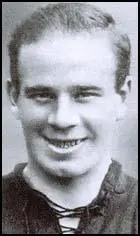Billy Blythe

William (Billy) Blythe was born in Dalkeith on 17th June 1895. He played local football in Scotland before joining Woolwich Arsenal in May 1914.
Blythe made his debut against Huddersfield Town on 21st November 1914. He served in the British Army during the First World War before returning to Arsenal in 1919.
In June 1919 Henry Norris appointed Leslie Knighton as manager of Arsenal. However, Knighton was just a figurehead and Norris took all the major decisions. For example, he told Knighton he could not spend more than £1,000 on anyone player. Understandably, the club enjoyed no success under Knighton's managership. Arsenal's best league position was 9th in 1921. In the FA Cup Arsenal only got beyond the second round once, in 1922, when they lost to Preston North End in the quarter finals after a replay.
Henry Norris sacked Leslie Knighton at the end of the 1924-25 season. In the summer of 1925 Herbert Chapman, the highly successful manager of Huddersfield Town, was persuaded to join Arsenal. Whereas Huddersfield had won the championship, Arsenal had narrowly escaped relegation by finishing in 20th position.
At that time most teams played in the 2-3-5 formation. This system dominated football until 1925 when the Football Association decided to change the offside rule. The change reduced the number of opposition players that an attacker needed between himself and the goal-line from three to two. Charlie Buchan suggested to Herbert Chapman, that the team should exploit this change in the law to create a new playing formation. At that time the centre-half played a much more attacking role. Buchan argued that the club should now have a more defence-minded player in that position and that he, rather than the two full-backs, should take responsibility for the offside trap. Buchan added that the full-backs should play just in front of the centre-half whereas one of the inside-forwards should act as a link between attack and defence. The formation was therefore changed from 2-3-5 to 3-3-4.
Herbert Chapman did not accept Buchan's suggestion at first. However, after Newcastle United beat Arsenal 7-0, Chapman called a player conference. According to Tom Whittaker, Buchan suggested: "Why not have a defensive centre-half, or third full-back, to block the gap down the middle?" Buchan added that one of the inside-forwards should drop back and become a link between defence and attack. This later became known as the "WM" formation.
Charlie Buchan wanted to play the roving inside-forward role. However, Herbert Chapman disagreed and selected veteran Andy Neil to become the link man in the system. At the time Neil was playing in the third-team. Chapman argued that Neil was "as slow as a funeral but has ball control" and could pass the ball accurately. Later this role went to Jimmy Ramsey.
In the 1925-26 season Arsenal finished in second-place to Chapman's old club, Huddersfield Town. Blyth played in 40 games that season. Top scorer was Jimmy Brain who established a new club record with 33 goals.
In the 1926-27 season Blythe replaced Jimmy Ramsey as the link man in the "WM" formation. Henry Norris refused to allow Herbert Chapman to spend too much money to strengthen his team and in the 1926-27 season Arsenal finished in 11th position. However, they did enjoy a good run in the FA Cup. They beat Port Vale (0-1), Liverpool (2-0), Wolverhampton Wanderers (1-0) and Southampton (2-1) to reach the final at Wembley against Cardiff City. Arsenal lost 1-0 but he had won his first and only medal while playing for the club.
In May 1929 Blythe was sold to Birmingham City. He had scored 51 goals in 343 games for Arsenal. He only spent one season at his new club before retiring from football.
Billy Blythe died in July 1968.
